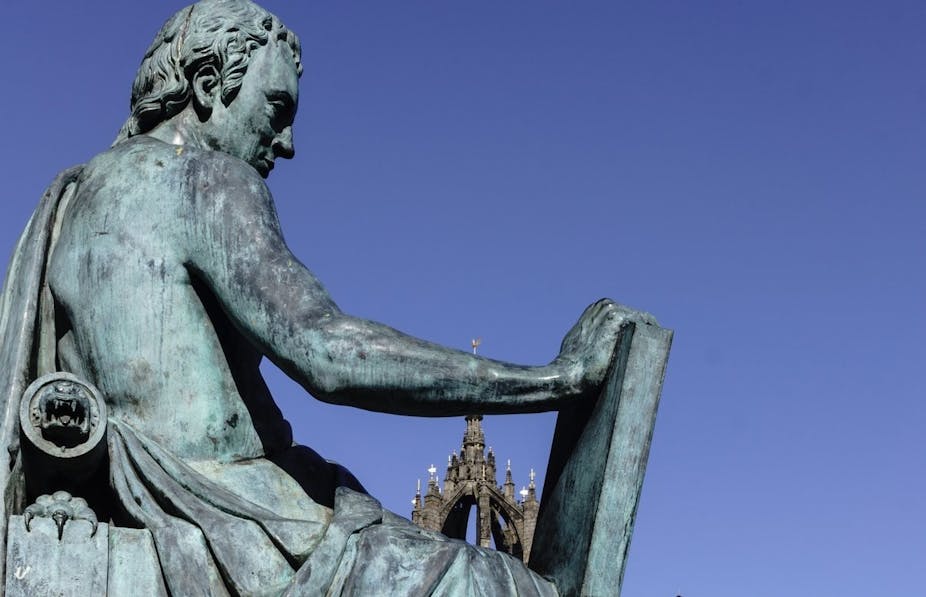Let me say something controversial about the televised election debates. To my mind, the leaders of the various political parties came across as being surprisingly likeable and decent. At the risk of appearing naive, I felt I was watching people who were basically sincere and publicly minded. If they were evasive, vague, hesitant, dogmatic or rude to any extent, so too might most of us have been in such a stressful context.

This is somewhat at odds with the commonly expressed belief that politicians tend to be greedy, selfish and dishonest. Russell Brand is maybe the archetypal example, going so far as to suggest that it is pointless to vote. He said in an interview with The Times that voting is a “Christmas card posted to nowhere with an X on it”.
Suppose every man a knave
But even if politicians are as bad as many think, does it follow that we shouldn’t vote for them? David Hume, the illustrious Scottish writer and thinker, has some useful insight here. He does not agree with the negative caricature of politicians, but he believed we should take the precaution of creating political institutions on the assumption that they are that bad. In his view, it is on the calibre of these institutions rather than that of our politicians that we depend for our liberty and security. As he put it, when it comes to creating these institutions, “every man must be supposed a knave”.
Writing in the 18th century, his argument was that the realistic aim of politics is to aspire to be governed by good laws rather than by good people. The MPs’ expenses scandal might for example have been prevented if we had kept Hume in mind when the system was devised. The old system rewarded bad behaviour. It encouraged good and mediocre people to behave badly, and failed to discourage bad people from behaving even worse.
On the other hand, the Labour decision in 1997 to switch control over interest rates from the Chancellor to the Bank of England followed Hume by removing the opportunity for politicians to use monetary policy for skulduggery. You could say the same of the Conservative-Liberal Democrat move to introduce a fixed-term parliament. Arguably this gave us a longer period of stability by removing the incentive for the government to make decisions that would make the outlook appear brighter earlier. The next government should certainly not discard it lightly.

The importance of voting
According to Hume, people act upon their short-term private interests. He thought that the trick was to try to make these interests such that they would conform to the public interest. He saw this as the basic attraction of parliamentary democracies. The desire to be elected and re-elected might prevent the actions of politicians from deviating too far from the public interest.
Even if all the candidates in an election were the same and even if they were all equally deceitful rogues, there would still be a point in engaging in political debate. There would still be a point is presenting arguments for and against particular policies.
In other words, we should vote not merely to elect one candidate rather than another but to try to maintain a context in which it is in the interests of politicians to behave as if they care for the public interest whether they do or not. Periodic elections arguably make all the politicians who are elected and re-elected behave less badly than they would otherwise do.
If they still behave badly, that is a reason for voting. It is not a reason for failing to vote, far less for encouraging other people to refrain from voting. To take a dim view of traditional politicians need not lead one to take a dim view of traditional politics.
Political parties
In spite of this defence of political institutions, Hume was not keen on political parties. He argued that people are: “generally more honest in their private than in their public capacity, and will go greater lengths to serve a party, than when their own private interest is alone concerned”.
In his view, the interests of their party leads politicians to be insulated from the wider political debate. He would rather a parliament in which individuals fought for many more competing interests. This seems short-sighted to me, particularly in the modern context. In reality, we need political parties to make agreement easier and to get things done.

Our present world of coalitions and hung parliaments would at least have been some consolation to Hume, since he saw them as a lesser evil than a single-party government. But this distrust of parties made no difference to his belief in the importance of voting. When the presenter David Dimbleby reminded the audience in the most recent television debate that they had only a handful of days to register to vote, Hume would have loudly approved.

